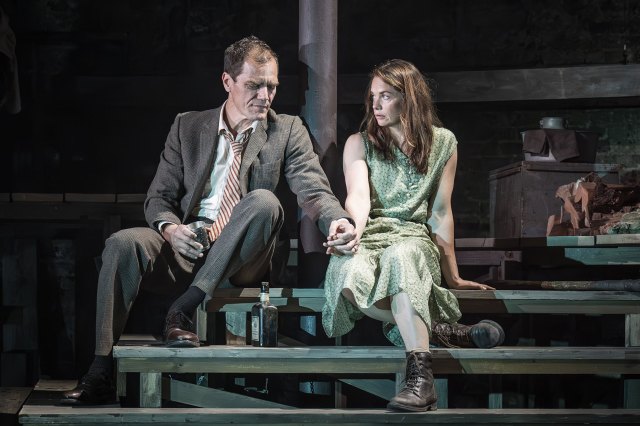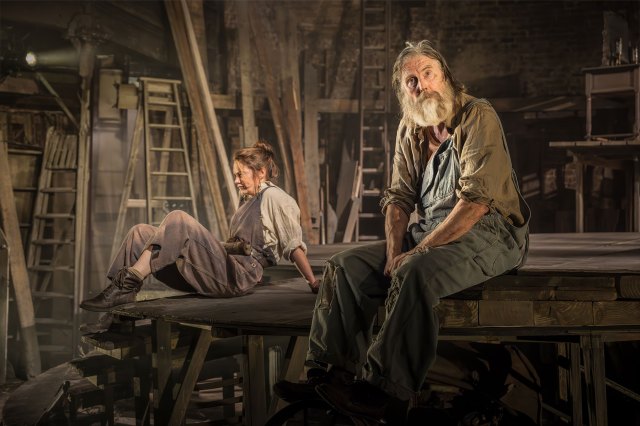A Moon for the Misbegotten with Ruth Wilson and Michael Shannon at Almeida Theatre – review
Rebecca Frecknall’s revival of the Eugene O’Neill classic runs until 16 August

Eugene O’Neill’s last play, more a follow-up than a sequel to his magnum opus Long Day’s Journey Into Night, has a curate’s egg quality to it. At points, when it reaches its full emotional register, it seems up there with the best of American 20th-century drama, while at others it feels distinctly flabby, stuffed with repetitions and superfluous detail.
At its heart, it’s a triangle of contrasting personalities, those of rackety Irish tenant farmer Phil Hogan (David Threlfall), his loyal but frustrated daughter Josie (Ruth Wilson), and their Connecticut landlord James ‘Jim’ Tyrone (Michael Shannon), a definite chip off the old block. A washed-up “third-rate ham”, as he refers to himself, Tyrone is mired in guilt since the death of his mother, and comes to the Hogan household seeking company, comfort and liquor, which he drinks like lemonade.
Phil, meanwhile, seems a more accomplished actor, forever scheming to get Josie to sleep with Jim and enforce their marriage to secure the farm. Threlfall gives a towering study of drunken Irish eloquence, as he shifts from deviousness to lovability, and apparent leglessness to sobriety in a moment, often to hilarious effect. It’s all part of a manipulation that grows increasingly disturbing as the play goes on, as he reveals himself as a man who leans too heavily on his daughter as collateral for his own failings, which have led his sons to scarper (we briefly meet one of them, Peter Corboy‘s meekly Mike, as the play opens).

Josie is a performer too, posing as the wisecracking town tart seemingly in a bid to dampen her father’s attempts to sell her off, whereas in fact she masks a deeply romantic soul. She was described by O’Neill as tall, heavy and broad-shouldered, and is often self-deprecating about her appearance. So in this sense, Wilson feels cast against type, but nevertheless gives an expansive, detailed performance (she’s on stage for nearly the entire three-hour duration) that captures both her inner sensitivities and simmering anger at her family’s situation. When she grabs a pitchfork to threaten their neighbouring millionaire Harder (Akie Kotabe), there seems no doubt at all she could gladly run him through.
Shannon, a double Oscar nominee who has previously played Jim Tyrone in Long Day’s Journey on Broadway, proves an excellent fit for the gaunt and haunted version of the character we encounter here. His thousand-yard stare, rasping delivery and tendency to lilt betray the depth of the drinking problem that, at several points, not least the climactic moments when he rests in Josie’s arms, appears to have already killed him. He’s pickled by the stuff. But we still see just enough of the razzle-dazzle instinct that led him to follow in his father’s thespian footsteps, albeit with similarly devastating results.
Rebecca Frecknall, adding another canonical American drama to her impressive CV, largely lets the dialogue breathe in a spare production played out on Tom Scutt’s almost Brechtian set, skirted by loose wooden planks and ladders, aptly representing means of progression that remain out of reach. A spotlight occasionally encircles the stage, which could equally be the moon or perhaps a ghostly reminder of Jim’s days on the boards. Either way, it shines unforgivingly on these broken souls, who must greet the dawning of another day, doomed to endlessly repeat their self-harming behaviours. In the end, Josie is the one we feel for most, a luminous mind stuck in the wrong place at the wrong time.
Aspects of the drama feel deeply rooted in the interwar period, the setting of which has wisely been retained, emphasised by costume designer Moi Tran’s shabby, prairieland aesthetic. Concerns with the importance of virginity, funeral rites, and a Catholic obsession with guilt feel more distant today. But the way it highlights the pre-crash wealth gap is anything but; the Hogans’ awareness that no amount of good, honest labour will lift them out of poverty is an all-too-familiar plight. It’s also an excellent study of addiction, the sense that the bottle’s ability to erase memory can be its greatest appeal. Although the bagginess of the play remains a sticking point, this is a valuable chance to see it delivered with dynamism and no small amount of humour from an ensemble of the very highest quality.















